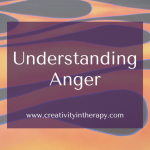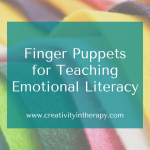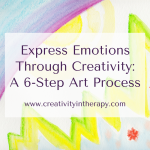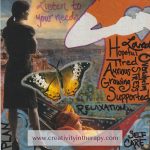
Guest Post By: Jessica Heckwolf, LCMFT, LCPAT, ATR-BC
Hello Creativity in Therapy Friends! It’s so good to be visiting again. This time of the year, after the September hustle has settled, I find myself reclaiming self-care practices. Adding new books to my therapy office library is one way I like to do this, and it’s been a treat perusing Carolyn’s bibliotherapy posts for recommendations.
This time of the year also brims with change for me. New beginnings and the physical transition of seasons are joined in Fall 2021 with many life changes. Thanks to the global pandemic, I find myself amidst circumstances, both personal and professional, I never could have predicted two years ago. Some of these changes are met as true gifts; other changes…well, I am still adjusting to them. Welcome or not, all of these transitions have been accompanied by different emotions, some which have not been easy to metabolize or let go of. In working with clients and colleagues, I know I’m not alone. I’ve found turning to the art and guidance from Dialectical Behavioral Therapy (DBT) can help.
Today I’d like to share an art prompt that can help bridge movement forward when working with an aspect or emotion in life that is perhaps unwanted, painful, or simply not working for us. This prompt is based on the Emotion Regulation skill set in DBT. In Emotion Regulation, one aim is to reduce the suffering associated with difficult emotions while increasing positive emotions and experiences. This involves learning how to describe what emotion is being experienced, and how to go towards and accumulate positive experiences to reduce the likelihood of more emotional suffering (Linehan, 1993). Emotion Regulation is considered a change skill because it is about taking steps to effectively experience emotions differently. This art prompt is called Flowers from Garbage.
Flowers from Garbage
In gardening, compost that comes from waste and discarded food can provide rich nutrients to foster health growth and abundant blooms. A similar process can be true for difficult parts of life – if we are willing to look for it. This art activity is intended to help you identify emotions, practice shifting from negative to positive life experiences, and find balance in emotions.
Supplies: Found Objects, Sculpting media, mixed media for construction.
Art Prompt
- First start by getting in touch with something that is “garbage” in your life. This is meant to be symbolic, not an actual item from your trashcan. Using sculpting material, create a sculpture with this “trash.” This could be a feeling, relationship, or situation that is problematic and you wish you could rid of. If you do not want to sculpt today, another option is to pick an actual object that represent this “trash.”
- Next, re-work your “garbage” sculptures to create something you see as beautiful. If you chose to use an actual object, use other found objects and art materials to transform it into a new sculpture of something you see as “beautiful.”
Some reflection questions to help process the final, “beautiful” art piece with your clients:
- What did you notice when you reworked the “garbage” sculpture into something you see as beautiful?
- Did you experience any shifts in thoughts or emotions from the beginning to the end of creating your sculpture?
- Are there any remnants of the original sculpture in the final sculpture?
I’d love to hear how using this art prompt works for you – please share any comments or thoughts you might have on creating Flowers from Garbage.
Reference:
Linehan, M. (1993). Skills Training Manual for Treating Borderline Personality Disorder. New York: The Guilford Press.
For more on using the art to introduce and build DBT skills with your clients, please check out the course, Art in DBT. I’m thrilled to collaborate with Carolyn and Creativity in Therapy to offer this 6-credit, online course. Art in DBT is a wonderful opportunity to deepen and expand your ability to build DBT skills with a variety of clients using a range of art activities. It will including hands on experientials like “Flowers from Garbage” to help you work through change in your own work. Hope to see you there!
Jessica is a licensed clinical marriage and family therapist (LCMFT) and board certified, licensed clinical professional art therapist (LCPAT). She earned a Master of Arts degree in Marriage and Family Therapy with Specialization in Clinical Art Therapy from Loyola Marymount University, graduating with honors. Jessica has 15 years’ experience working with adults, families, children, and adolescents in inpatient, community, residential, day treatment, and school settings in Los Angeles, Baltimore, and Boston. Jessica has taught art therapy courses and workshops in university, hospital and professional conference settings. Her work on coordinating art therapy and DBT was published in The Arts in Psychotherapy. Jessica’s treatment approach is rooted in family systems and psychodynamic theory. Additionally, she utilizes skill training based in dialectical behavioral therapy to foster lasting change towards healthy living and relationships. Central to Jessica’s psychotherapy approach is use of art making as an agent for insight and catalyst for change. Jessica currently works in private practice in Annapolis, MD. She is an active painter and loves whale watching.
This blog is not intended to diagnose or treat any mental health conditions. All directives, interventions, and ideas should be used by qualified individuals within the appropriate bounds of their education, training, and scope of practice. Information presented in this blog does not replace professional training in child and family therapy, art therapy, or play therapy. Art therapy requires a trained art therapist.







Great blog thank you for sharing